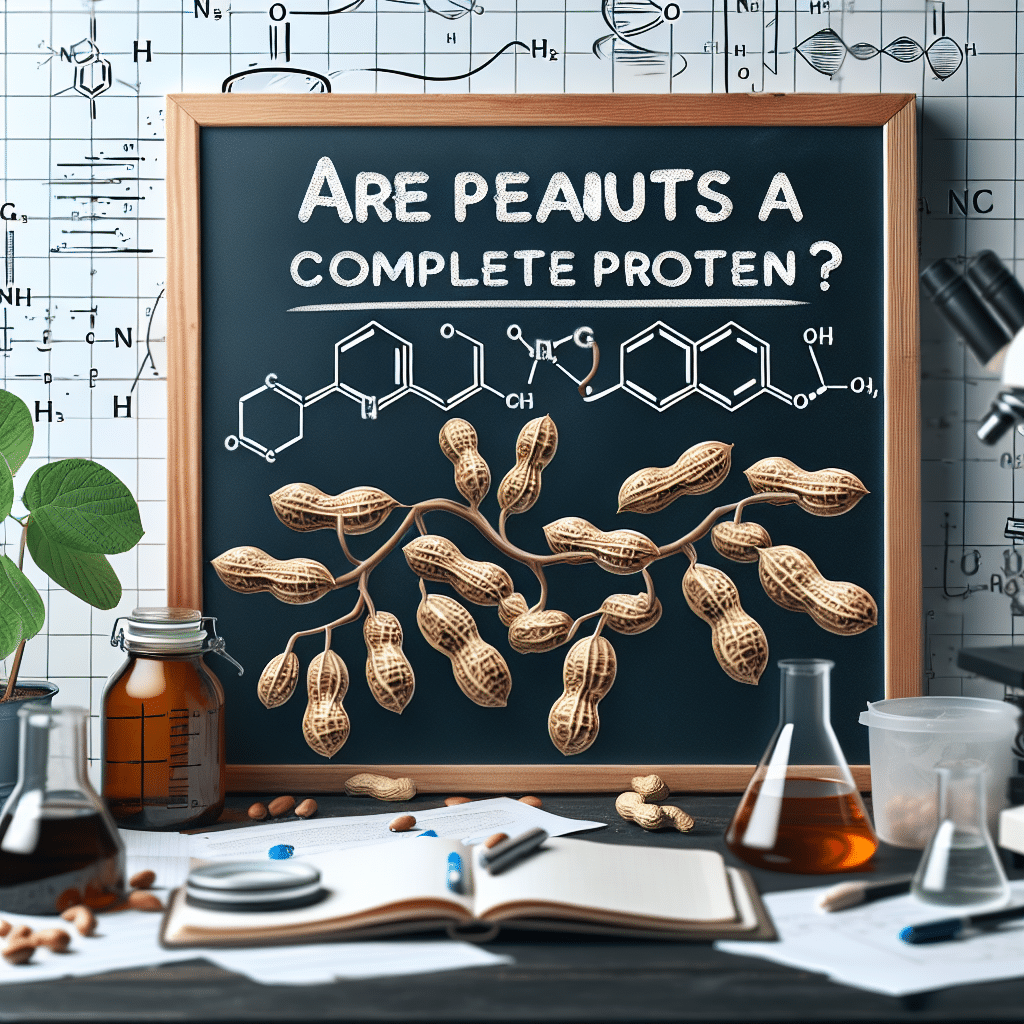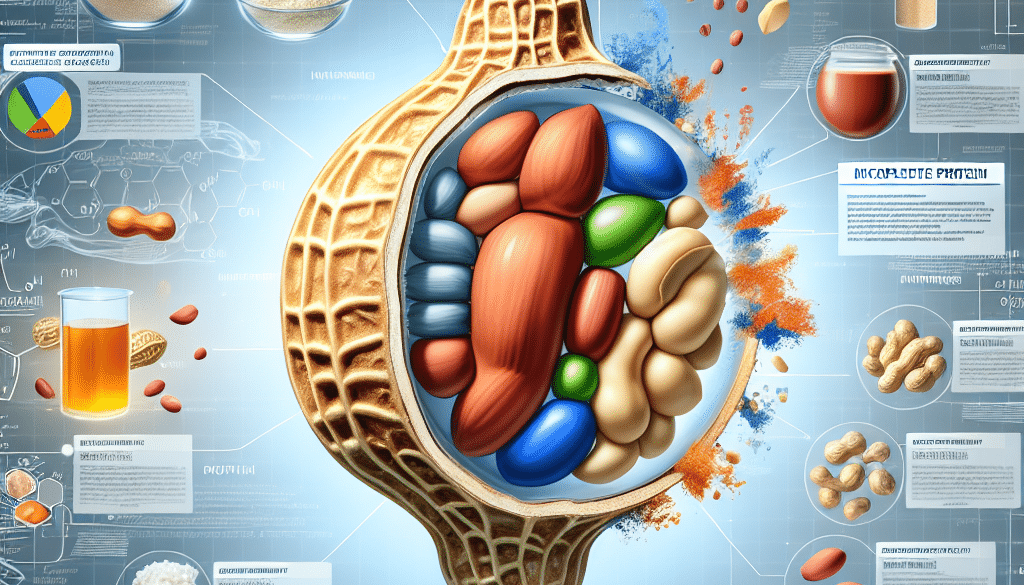Are Peanuts a Complete Protein? Unveiling The Truth
-
Table of Contents
- Are Peanuts a Complete Protein? Unveiling The Truth
- Understanding Protein Quality
- Nutritional Profile of Peanuts
- Are Peanuts a Complete Protein?
- Comparing Peanuts to Other Protein Sources
- Health Benefits of Peanuts
- Conclusion: The Role of Peanuts in a Balanced Diet
- Discover ETprotein’s High-Quality Protein Products
Are Peanuts a Complete Protein? Unveiling The Truth

Proteins are the building blocks of life, essential for the growth and repair of cells and tissues in our bodies. A complete protein is one that contains all nine essential amino acids that the human body cannot synthesize on its own. These amino acids must be obtained through diet. The question of whether peanuts are a complete protein is a topic of interest for many health-conscious individuals, vegetarians, and vegans who seek plant-based protein sources. In this article, we will explore the nutritional profile of peanuts, compare them to other protein sources, and unveil the truth about their protein quality.
Understanding Protein Quality
Before diving into the specifics of peanuts, it’s important to understand what makes a protein “complete.” Proteins are made up of amino acids, and there are 20 different amino acids that can form a protein. Of these, nine are considered essential because our bodies cannot produce them. A complete protein source contains an adequate proportion of each of these essential amino acids.
- Histidine
- Isoleucine
- Leucine
- Lysine
- Methionine
- Phenylalanine
- Threonine
- Tryptophan
- Valine
Protein quality is measured in several ways, including the Protein Digestibility Corrected Amino Acid Score (PDCAAS) and the newer Digestible Indispensable Amino Acid Score (DIAAS). These methods evaluate the digestibility and the proportion of essential amino acids present in a protein source.
Nutritional Profile of Peanuts
Peanuts, despite their name, are not true nuts but legumes. They are a popular snack and ingredient in various cuisines worldwide. Nutritionally, peanuts are rich in protein, healthy fats, vitamins, and minerals. A 100-gram serving of peanuts typically contains:
- Approximately 25-30 grams of protein
- 45-50 grams of fat, mostly monounsaturated and polyunsaturated fats
- 8-10 grams of dietary fiber
- Essential vitamins and minerals such as B-vitamins, magnesium, phosphorus, and zinc
While peanuts have a high protein content, the question remains: are they a complete protein?
Are Peanuts a Complete Protein?
Peanuts contain all nine essential amino acids, but they do not provide them in sufficient quantities to be considered a complete protein. The limiting amino acid in peanuts is lysine, which means that peanuts have less lysine than what is required by the body for protein synthesis.
However, this does not mean that peanuts are not a valuable protein source. When combined with other plant-based foods that are rich in lysine, such as legumes or grains, the overall amino acid profile can be balanced, making it possible to obtain all essential amino acids from a varied plant-based diet.
Comparing Peanuts to Other Protein Sources
When compared to animal-based proteins like meat, eggs, and dairy, which are complete proteins, peanuts have a lower proportion of certain amino acids. However, they are still a better source of protein than many other plant-based foods. For example, grains and most vegetables have lower protein content and are more deficient in essential amino acids than peanuts.
In the context of other legumes, peanuts have a similar protein content to beans, lentils, and chickpeas, but each legume varies in its amino acid profile. This diversity is beneficial for those following a plant-based diet, as consuming a variety of legumes can help ensure a more complete amino acid intake.
Health Benefits of Peanuts
Beyond their protein content, peanuts offer several health benefits:
- Heart Health: The monounsaturated and polyunsaturated fats in peanuts can help lower bad cholesterol levels and reduce the risk of heart disease.
- Weight Management: Peanuts have a high satiety factor, which can help control appetite and support weight management.
- Antioxidant Properties: Peanuts contain antioxidants such as resveratrol, which can help protect the body against oxidative stress.
It’s important to note that while peanuts are nutritious, they should be consumed in moderation due to their high-calorie content.
Conclusion: The Role of Peanuts in a Balanced Diet
Peanuts are not a complete protein on their own, but they are a valuable part of a balanced diet, especially when combined with other plant-based foods. They provide a substantial amount of protein, healthy fats, and other nutrients that contribute to overall health. For vegetarians, vegans, and those looking to reduce their meat consumption, peanuts can be an important component of a varied and nutritious diet that meets all essential amino acid requirements.
By understanding the nutritional profile of peanuts and how to combine them with other foods, individuals can enjoy the benefits of this versatile legume while maintaining a healthy and complete protein intake.
Discover ETprotein’s High-Quality Protein Products
If you’re looking for a reliable source of plant-based proteins, ETprotein offers a range of products that cater to various dietary needs. Their selection includes organic rice protein, clear rice protein, pea protein, clear pea protein, pumpkin seed protein, sunflower seed protein, mung bean protein, and peanut protein. These products are characterized by their neutral taste, non-GMO, and allergen-free attributes, making them suitable for a wide array of applications in the food and beverage industry.
ETprotein’s commitment to quality and customer satisfaction makes them a top choice for anyone seeking to incorporate high-quality plant proteins into their diet or products. Contact ETprotein to learn more about their offerings and how they can meet your protein needs.
About ETprotein:
ETprotein, a reputable protein Chinese factory manufacturer and supplier, is renowned for producing, stocking, exporting, and delivering the highest quality organic bulk vegan protein and plant proteins. They include Organic rice protein, clear rice protein, pea protein, clear pea protein, pumpkin seed protein, sunflower seed protein, mung bean protein, peanut protein etc. Their offerings, characterized by a neutral taste, non-GMO, allergen-free attributes, cater to a diverse range of industries. They serve nutraceutical, pharmaceutical, cosmeceutical, veterinary, as well as food and beverage finished product distributors, traders, and manufacturers across Europe, USA, Canada, Australia, Thailand, Japan, Korea, Brazil, and Chile, among others.
ETprotein specialization includes exporting and delivering tailor-made protein powder and finished nutritional supplements. Their extensive product range covers sectors like Food and Beverage, Sports Nutrition, Weight Management, Dietary Supplements, Health and Wellness Products, and Infant Formula, ensuring comprehensive solutions to meet all your protein needs.
As a trusted company by leading global food and beverage brands and Fortune 500 companies, ETprotein reinforces China’s reputation in the global arena. For more information or to sample their products, please contact them and email sales(at)ETprotein.com today.














